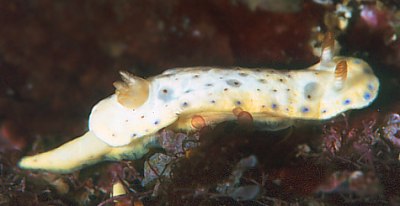
Chromodoris sp. 14
Order: NUDIBRANCHIA
Suborder: DORIDINA
Family: Chromodorididae
PHOTO
Hachijo Island, Japan. Photo: Shouichi Kato
Authorship detailsRudman, W.B., 2002 (April 22) Chromodoris sp. 14 [In] Sea Slug Forum. Australian Museum, Sydney. Available from http://www.seaslugforum.net/find/chrosp14
Related messages
Re: A juvenile Chromodoris sp.14 ? from nthn Mariana Ids
February 8, 2008
From: Yuji Fujie
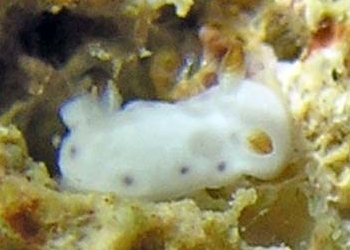
Concerning message #6459:
Dear Dr.Bill,
Here we have two pictures.
At first, we thought this animal is a juvenile Hexabranchus sanguineus, Hypselodoris rudmani or Chromodoris rufomaculata but they don't really look the same.
How about Chromodoris sp. 14 from Hachijo island ?
I think our animal looks very much like a juvenile body, but nobody seems to have seen an adult body of Chromodoris sp. 14.
Locality: LauLau Beach, 8m, Saipan, Northern Mariana Islands, Pacific Ocean, 07 October 2006, hid in a slight depression in the dead coral. Length: 3 mm. Photographer: Yukari Tani and Takao Urasawa.
Best regards,
Yuji
ds-with@isletwind.com
Yuji Fujie, 2008 (Feb 8) Re: A juvenile Chromodoris sp.14 ? from nthn Mariana Ids. [Message in] Sea Slug Forum. Australian Museum, Sydney. Available from http://www.seaslugforum.net/find/21338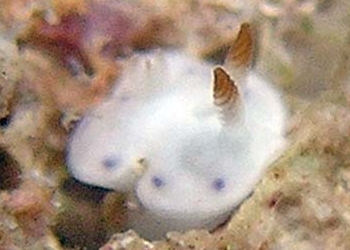
Dear Yuji,
At 3 mm I am sure your animal is a juvenile and juveniles are often difficult to identify. Howevere I am pretty sure your identification is correct. I think the animal from Hachijo Island in the earlier message is most probably an adult or at least has reached its adult shape and proportions. Although 15 mm doesn't seem very long, some species don't grow much bigger than that.
Best wishes,
Bill Rudman
Re: Hypselodoris rudmani from sthn Queensland?
July 11, 2007
From: Colin Ogden
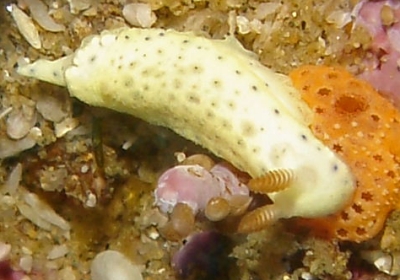
Concerning message #19989:
Hi Bill,
Thanks for the response on the query of H. rudmani vs H. sagamiensis. I want to continue to accept that they are 2 different species, so I will try to get as many photos as I can on these. Here is one from my files which I think conforms more with the description of the H. rudmani. It spent a long time on the red coloured object. I am very weak on identification of sponges, so I dont know what it was investigating.
Locality: Sodwana Bay, 20 metres, South Africa, Indian, June 2006, reef. Length: 20mm. Photographer: Colin Ogden.
regards
Colin
scubaco@iafrica.com
Dear Colin,
Firstly, I have spent a long time looking at the 'red-coloured object' and am pretty sure it is a compound ascidian rather than a sponge, so not likely to be of significance.
Concerning the nudibranch, there are not too many species with black spots on translucent patches like this. The only one that seems to fit is Chromodoris sp 14 from Japan which is a long way from South Africa.
Best wishes,
Bill Rudman
Hypselodoris bertschi ? from Hachijo Island, Japan
April 26, 2002
From: Shouichi Kato


Dear Bill,
Are these two photos, color variations of Hypselodoris bertschi?. They look very similar to the species shown in the letter from Mr.Jun Imamoto dated on Feb. 9, '02. This species can be seen commonly at a shore reef shallower than 15m.
Your advice would be appreciated.
Place: Hachijo Island, Japan
Upper: Depth: 15m., Size: about 15mm
Lower: Depth: 15m., Size: about 20mm
Regards,
S. Kato
regulus@tokyo7.ne.jp
Kato, S., 2002 (Apr 26) Hypselodoris bertschi ? from Hachijo Island, Japan. [Message in] Sea Slug Forum. Australian Museum, Sydney. Available from http://www.seaslugforum.net/find/6459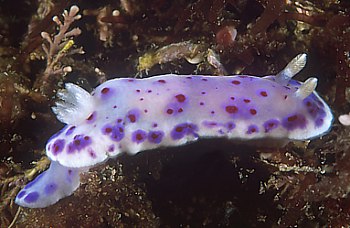
Dear Shouichi,
Your animals certainly have similarities with Jun Imamoto's photo but in that animal there are distinct white lines on the mantle, the orange band on the rhinophore is midway down the club, and there are pinkish spots around the mantle edge. I have included a copy of Stuart Hutchison's photo of Chromodoris thompsoni, a species only found in southeastern Australia. Although I don't think they are related, your animal certainly has a very similar pattern. In particular all the small dark spots in your animal are found on a larger translucent bluish grey spot, just as in C. thompsoni. I will call it Chromodoris sp 14.
Best wishes,
Bill Rudman
